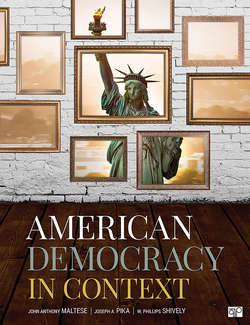Читать книгу American Democracy in Context - Joseph A. Pika - Страница 53
На сайте Литреса книга снята с продажи.
Motivations for Coming to the Colonies
ОглавлениеSeveral factors led to the migration of people from England and other European countries to North America. One factor was religion. As early as the 1560s, French Protestants (known as Huguenots) came to what is now South Carolina and Florida to escape religious persecution, and the New England colonies in particular were settled by people seeking religious freedom for themselves. Religious beliefs across the colonies varied considerably. The Pilgrims—a group of religious separatists (those who advocated a complete break with, or separation from, the Church of England)—sailed on the Mayflower in 1620 and settled the Plymouth colony in Massachusetts. The Puritans—a group of nonseparatists (those who sought to reform the Church of England rather than break away from it)—settled the Massachusetts Bay colony, soon outnumbering the Pilgrims. The Maryland colony was originally envisioned as a haven for English Catholics, though in the end, few Catholics settled there. Meanwhile, Huguenots were also drawn to the religiously tolerant Dutch colony of New Netherland (which later became the English colonies of New York and New Jersey) because the Dutch Reformed Church there reflected the Huguenots’ Calvinist beliefs.
In addition to religion, economic incentives drew people to the colonies. This was especially true in colonies from Maryland southward, where colonists were lured by the opportunity to make money by growing tobacco. Virginia, for instance, began not as a religious refuge but as a corporate colony financed by a joint stock company. As a result, the southern colonies were more religiously and ethnically diverse than their northern counterparts.4 The emphasis on growing crops for profit in the south led to the development of large plantations and inhibited urban development. Initially, these plantations lured young men from England and other European countries to work on them as indentured servants—laborers who entered a contract to work for no wages for a fixed period of time (usually three to seven years) in return for food, clothing, shelter, and their transportation to the colony. Some have suggested that as many as half of all white immigrants to the colonies during the seventeenth and eighteenth centuries may have come as indentured servants. Later, white servitude gave way to slavery when plantation owners resorted to buying slaves from Africa.
